Welcome to our guide on the top Character AI alternatives! Whether you’re exploring creative writing, game development, or just curious about AI-driven characters, this article will provide you with a clear and easy-to-understand rundown of your best options.
Let’s dive right in!
Contents
What is Character AI?
Character AI refers to artificial intelligence systems designed to create, simulate, or manage virtual characters. These characters can range from digital assistants to complex characters in storytelling and gaming environments, often capable of engaging in human-like interactions.
Top 10 Character AI Alternatives
Each of these alternatives brings something unique to the table, from enhanced interactivity to specialized content creation.
Here’s the lowdown:
#1. Replika
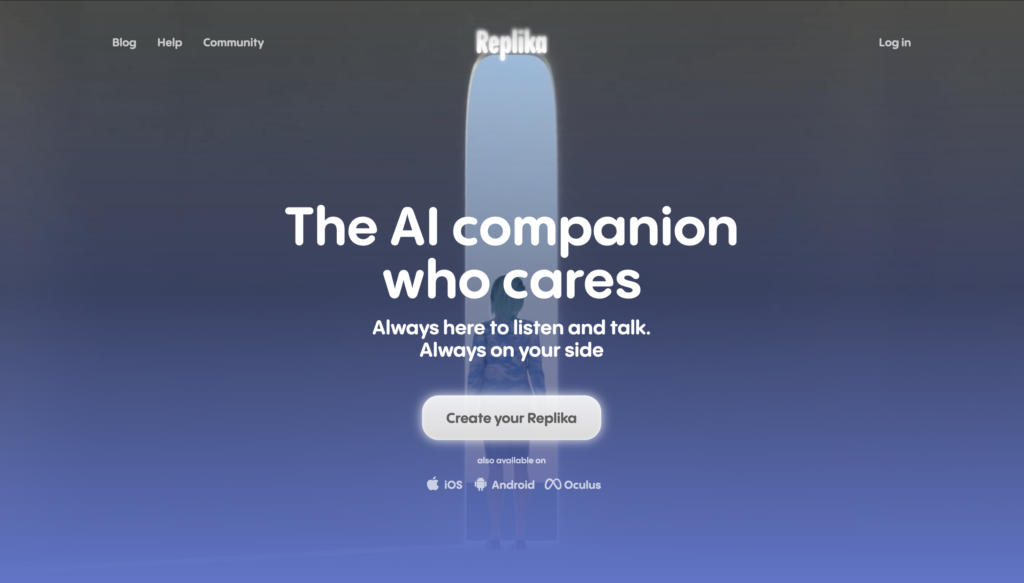
Replika is a companion AI chatbot designed to provide emotional support and companionship.
Developed by Luka, Inc., it uses machine learning to adapt its interactions based on user conversations, growing more personalized over time.
Users can engage with Replika through text, voice calls, and even adjust the relationship status, which changes the AI’s interaction style.
Key features of Replica include:
Personal Growth: Promotes emotional health through meaningful conversations.
Customization: Allows personalization of the AI’s appearance and voice.
Privacy: Ensures conversations are confidential and secure.
#2. Dialogflow
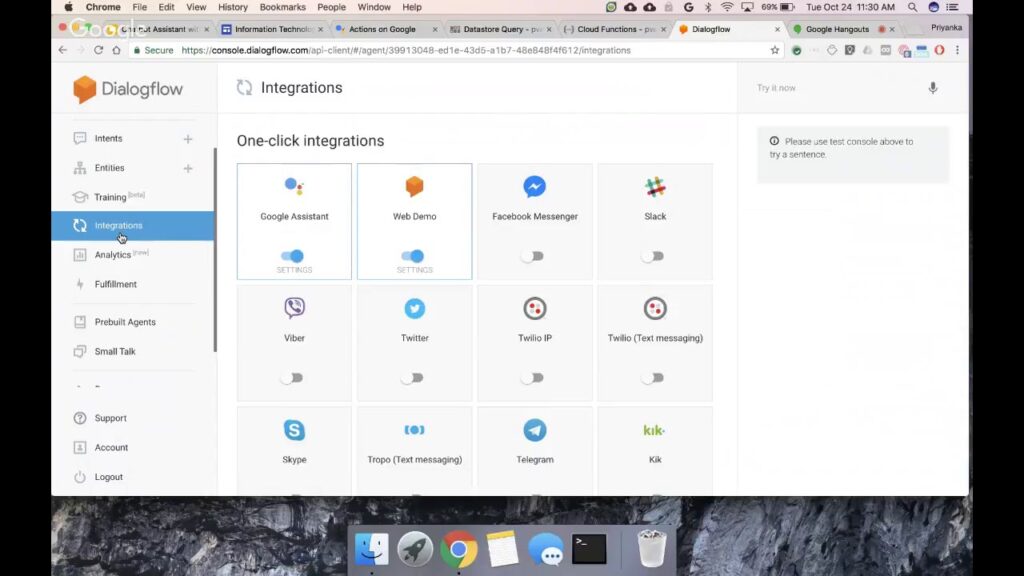
Dialogflow by Google is another excellent alternative for creating conversational AI interfaces. It’s a comprehensive development suite for building chatbots and virtual assistants that can engage in rich, natural language interactions with users.
Initially known as API.AI before it was acquired by Google, Dialogflow leverages Google’s machine learning expertise to process and understand complex user inputs.
Key features of Dialogflow include:
Natural Language Understanding (NLU): Dialogflow leverages Google’s advanced NLU to interpret user intents and manage conversational subtleties effectively.
Cross-Platform Integration: Supports integration with platforms like Google Assistant, Facebook Messenger, Slack, enabling deployment across various channels.
Voice and Text Processing: Accommodates both voice and text inputs, offering versatile user interaction options.
Analytics and Optimization: Features built-in analytics to monitor interactions and performance, facilitating ongoing improvements.
#3. ChatGPT
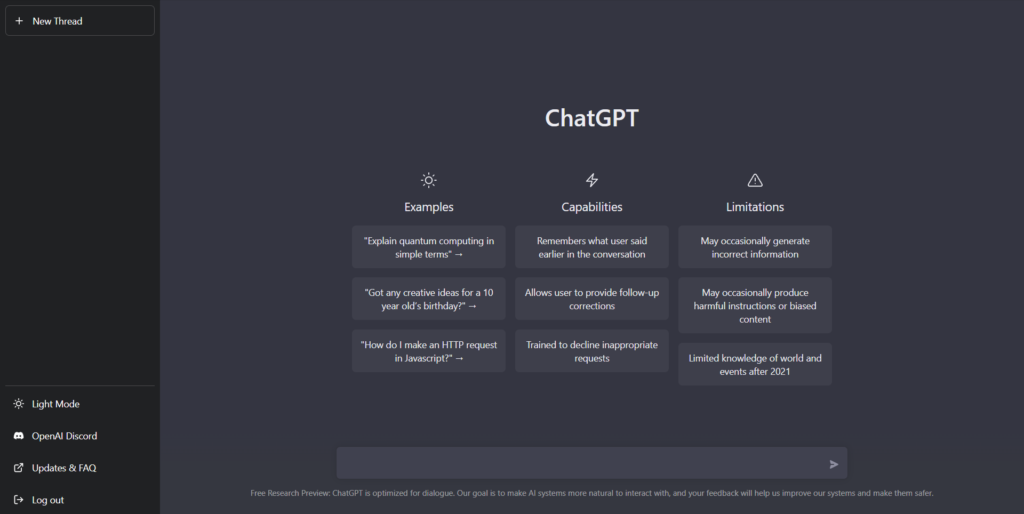
ChatGPT is a variant of the GPT-3 model by OpenAI, specifically optimized for conversational tasks.
This AI is designed to generate human-like responses in a chat format, making it ideal for applications requiring interactive communication, such as customer service bots, virtual assistants, and interactive characters in games and narratives.
Key features of ChatGPT include:
Conversational Intelligence: It is fine-tuned to understand and generate responses that are contextually appropriate and conversationally fluent.
Continual Learning: While interacting, ChatGPT adapts to the user’s style and preferences, improving its responses over time.
Scalability: It can handle a high volume of interactions simultaneously, making it suitable for both small and large-scale applications.
#4. AIDungeon
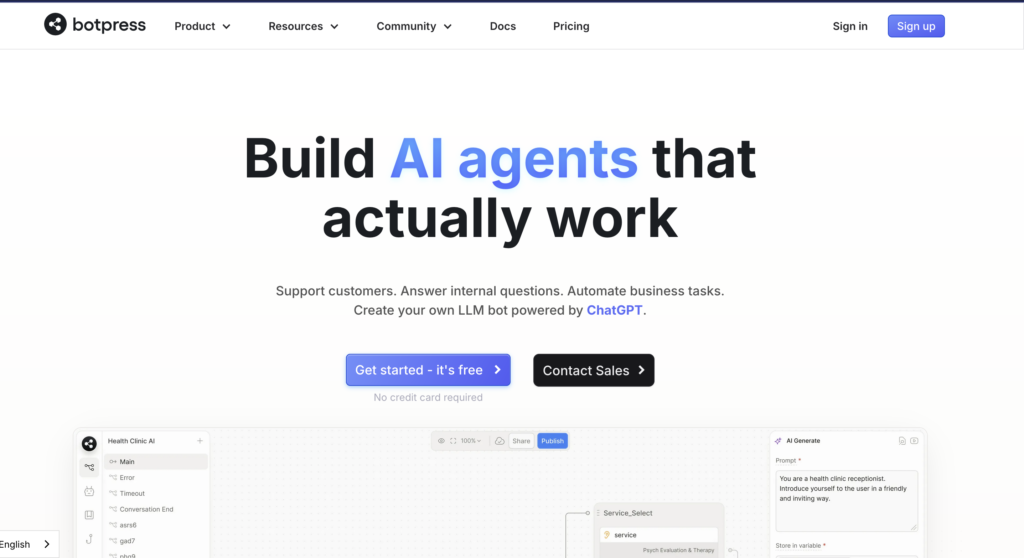
AI Dungeon is a text-based adventure game that utilizes artificial intelligence to generate limitless story possibilities, allowing players to enter any action or dialogue they can imagine.
Developed by Latitude, the game is powered by advanced AI models, including versions of OpenAI’s GPT-3, which enable it to respond dynamically to user inputs.
Key features of AI Dungeon include:
Unlimited Possibilities: The AI creates unique responses and story paths based on player inputs, making every game session different.
Interactive Storytelling: Players can take any action or dialogue route, from simple decisions to complex narratives, with the AI adapting the story accordingly.
Multiplayer Mode: AI Dungeon also offers a multiplayer mode, where multiple players can join the same adventure and contribute to the unfolding story.
#5. Character Engine

Character Engine is a sophisticated tool designed to create deeply interactive and responsive characters for games and narratives.
Developed by Spirit AI, this technology focuses on enabling characters to have more nuanced interactions with users, supporting complex storytelling and dialogue systems.
Key features of Character Engine include:
Deep Personality and Memory: Characters built with Character Engine can remember past interactions and develop personality traits that influence their behavior and responses.
Contextual Interaction: The engine allows characters to understand and react to context within conversations, making interactions feel more natural and engaging.
Customizable Behaviors: Developers can script specific behaviors and dialogues, tailoring characters to fit the narrative and emotional tone of their project.
#6. Botpress

Botpress is an open-source chatbot platform designed for building intelligent and efficient chatbots for various applications.
It’s particularly favored for its ease of use and the control it gives developers over the bot development process.
Key features of Botpress include:
Open-Source: Developers have access to the source code, allowing for deep customization and integration into existing systems.
Visual Flow Editor: Botpress includes a user-friendly visual interface for designing conversation flows, making it accessible for non-programmers while still powerful for developers.
NLP Capabilities: It comes equipped with natural language processing tools that help the chatbot understand and process user inputs more effectively.
Extensibility: Thanks to its modular structure, Botpress can be extended with custom functionalities and integrations, adapting to specific needs of any business or service.
#7. Zoho Zia
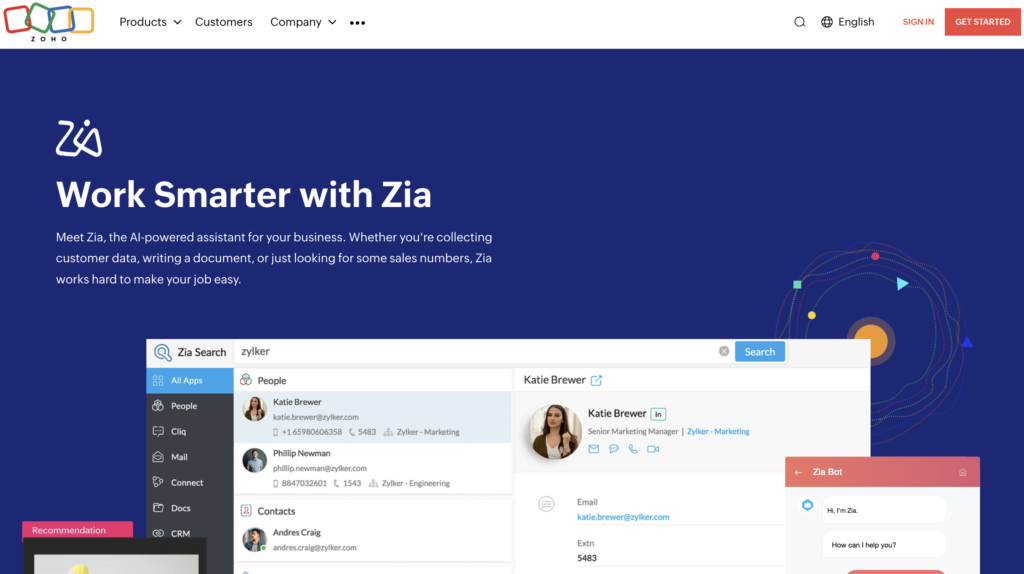
Zoho Zia is an AI-powered assistant integrated into the Zoho suite of products, designed to enhance productivity and streamline operations for businesses using Zoho applications. Zia leverages machine learning, natural language processing, and predictive analytics to assist users across various Zoho apps.
Key features of Zoho Zia include:
Contextual Assistance: Zia provides relevant information and support based on the context of the user’s work, making recommendations and automating tasks where possible.
Voice and Chat Capabilities: Users can interact with Zia through voice commands or text, allowing for flexible modes of operation.
Predictive Analytics: Zia analyzes data across Zoho applications to offer predictive insights, helping businesses make informed decisions.
Automation: Zia can automate routine tasks like data entry and report generation, saving time and reducing errors.
#8. Hugging Face’s Transformers
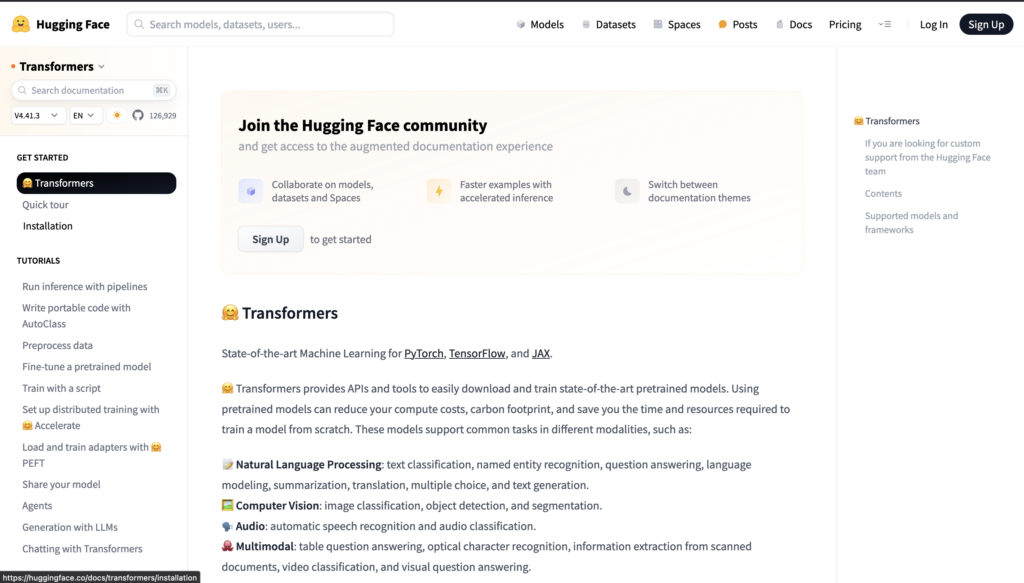
Hugging Face’s Transformers library is a popular and powerful tool for natural language processing (NLP) tasks.
We provide state-of-the-art pre-trained models that can be fine-tuned for a wide range of NLP applications, such as text classification, translation, summarization, and more.
The tech company Hugging Face developed this open-source library to democratize cutting-edge AI technologies and make them accessible to both researchers and developers.”
Key features of Hugging Face’s Transformers include:
Extensive Model Hub: The library includes a vast collection of pre-trained models, including BERT, GPT, T5, and many others, which are readily available for use and adaptation.
Flexibility and Ease of Use: Transformers supports multiple deep learning frameworks, including PyTorch, TensorFlow, and JAX, facilitating seamless integration into existing projects.
Community and Support: As an open-source project, it benefits from a large community of contributors who continuously enhance the library and provide extensive documentation and support.
#9. Microsoft Azure AI
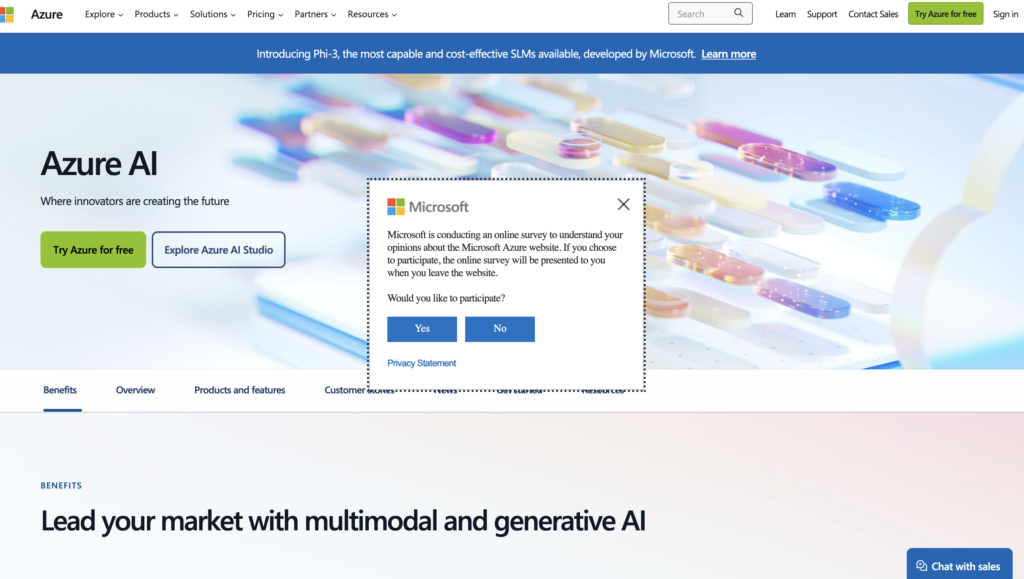
Microsoft Azure AI is a comprehensive suite of artificial intelligence services and cognitive APIs offered by Microsoft through its Azure cloud platform. This collection of tools enables developers and businesses to build, deploy, and manage AI applications at scale. Azure AI designs artificial intelligence to be more accessible and useful across a variety of industries, including healthcare, finance, retail, and education.
Key features of Microsoft Azure AI include:
Wide Range of AI Services: Azure AI offers diverse tools like Azure Machine Learning, Azure Cognitive Search, and Azure Cognitive Services, which include pre-built models for various AI tasks.
Scalability and Flexibility: Supports scalable AI deployments suitable for high-volume workloads and high-performance computing needs.
Integrated Development Environment: Provides seamless tools and integrations with Microsoft products, facilitating easy AI adoption in existing business infrastructures.
Security and Compliance: Adheres to strict Microsoft security protocols and supports compliance with industry standards, ensuring robust data protection and privac
#10. IBM Watson Assistant
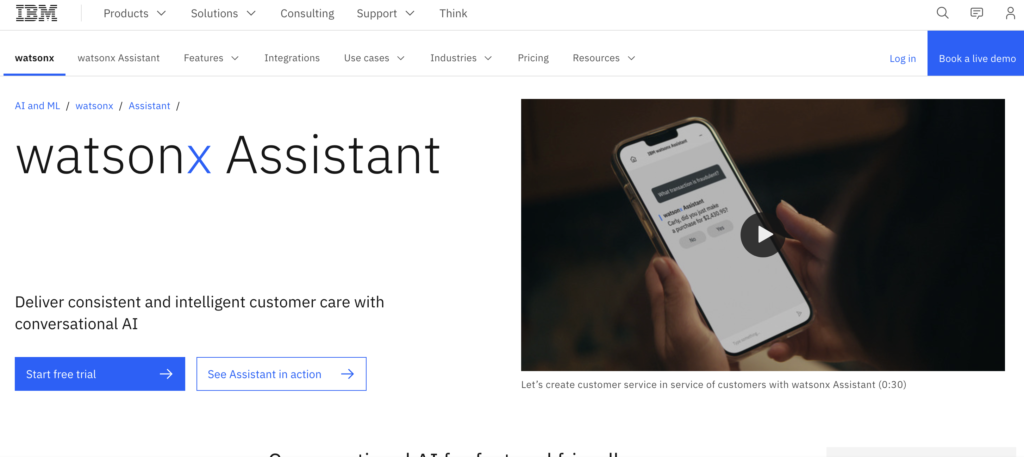
IBM developed IBM Watson Assistant, a powerful AI-powered virtual assistant, to provide businesses with the ability to create sophisticated conversational interfaces in any application, device, or channel.
Watson Assistant is part of IBM’s broader Watson suite, which harnesses artificial intelligence to enable a wide range of cognitive computing features.
Key features of IBM Watson Assistant include:
Advanced Dialogue Management: Watson Assistant uses natural language understanding (NLU) to interpret and respond to user inquiries with high accuracy. It can manage complex conversations and understand context to provide more relevant responses.
Multichannel Capabilities: You can integrate it across multiple platforms including websites, mobile apps, and IoT devices, ensuring consistent interactions across all customer touchpoints.
Customizable and Scalable: The tool allows for extensive customization to fit specific business needs and can scale as those needs grow or change.
Data Privacy and Security: IBM places a strong emphasis on security and privacy, with Watson Assistant providing data isolation and ownership controls to comply with global regulations.
NSFW Character AI Alternatives
For those seeking NSFW (Not Safe For Work) character AI alternatives, platforms like Project December and Adult AI offer more mature interactions.
Designers create these tools with age restrictions and tailor the content for adult users.
Reasons for Seeking Character AI Alternatives
You might seek alternatives to Character AI for various reasons:
- Cost: Free alternatives can provide similar functionalities without the expense.
- Features: Different tools might offer unique features that better suit specific projects or needs.
- Privacy: Concerns about data privacy might lead you to seek platforms with more stringent privacy policies.
The Bottom Line
Exploring different Character AI alternatives opens up a world of possibilities for digital interaction and storytelling. Whether for personal use, gaming, or business, there’s a tool out there that can meet your needs.
Frequently Asked Questions
Q. Are these alternatives suitable for beginners?
Yes, many of these platforms are user-friendly and suitable for those just starting out with character AI.
Q. Can I use these tools for developing games?
Absolutely! Many of the alternatives listed are perfect for creating dynamic characters in games.
Q. What should I consider when choosing an alternative?
Consider your specific needs, budget, and the level of complexity you need in character interaction.

